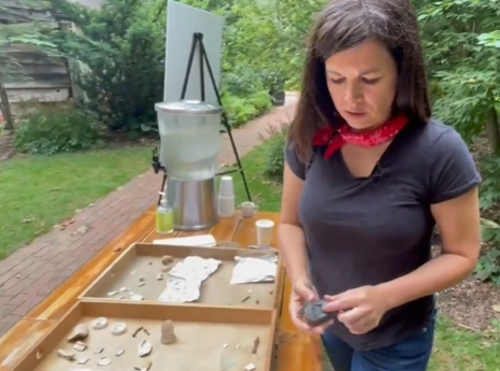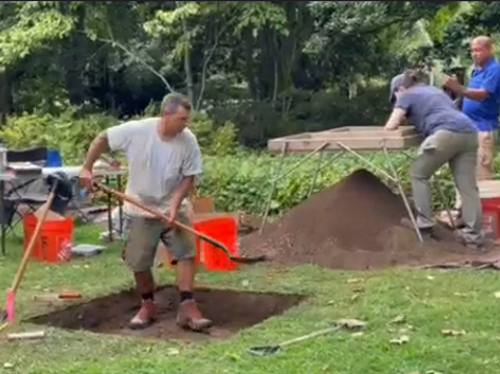Archaeologists from the Maryland Department of Transportation are helping excavate two small Colonial-era cabins near the historic Elkridge Furnace in Howard County, MD, located on land originally purchased for a highway project.
[Above photo by the Maryland DOT]
In the 18th and 19th centuries, the Elkridge iron furnace –– used enslaved, indentured, and convict labor. Its use of slave labor is why it is now part of the U.S. National Park Service’s “Underground Railroad Network to Freedom,” which chronicles the history of slavery in the United States.
Iron furnaces used intense heat to convert iron ore into “pig iron” which could then be made into tools, wagon wheels, and other iron-based products. The white-hot fires required for this conversion made them labor-intensive and dangerous places to work.
This $50,000 archaeological project is a partnership between Maryland DOT and the Maryland Department of Natural Resources or DNR. The Maryland DOT’s State Highway Administration originally owned the land in conjunction with its construction of nearby I-195 but later conveyed it to DNR to save the historic complex.
The excavation team – led by Dr. Julie Schablitsky, Maryland DOT’s chief of cultural resources – uncovered brick floors, stone foundations, and various artifacts. Archaeologists hope to determine the age of the buildings and their relationship to the historic iron furnace.

“Archaeology is our last chance to understand the lives of these iron furnace workers who endured horrific conditions,” said Dr. Schablitsky in a statement. “We are piecing together their life one ceramic sherd and lost button at a time.”
“This latest partnership between MDOT and DNR shows our shared commitment to collaborate with fellow agencies and the community to discover and preserve one of Maryland’s greatest assets: our history,” added MDOT Secretary James F. Ports Jr.
The agency said any archaeological findings found at the site would become part of “interpretive materials” used by DNR, with the investigation also helping guide DNR’s work to restore the buildings. In the future, DNR and an on-site restaurant – Elkridge Furnace Inn – hope to use the archaeological discoveries to share the history of the site and the lives of the ironworkers with the public.
“As stewards of Maryland’s natural and cultural resources, we are proud to partner with MDOT and support this archaeological work,” DNR Secretary Jeannie Haddaway-Riccio said. “Having this information on the Elk Ridge Furnace site is invaluable as we work to interpret the important history of the Underground Railroad and convey what life was like during our nation’s early Industrial Revolution.”
This effort follows a previous dig conducted by Maryland DOT’s archeological team in 2021 that helped discover a historic home site once owned by the father of famed abolitionist Harriet Tubman, who helped slaves escape north via the Underground Railroad.
The agency’s team discovered the former home of Harriet Tubman’s father, Ben Ross, on property acquired in 2020 by the U.S. Fish and Wildlife Service or USFWA as an addition to Blackwater National Wildlife Refuge in Dorchester County, MD.

